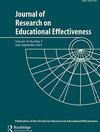干预效应还是测量假象?使用不变量模型揭示实验研究中的反应偏移
IF 1.6
4区 教育学
Q2 EDUCATION & EDUCATIONAL RESEARCH
Journal of Research on Educational Effectiveness
Pub Date : 2024-01-03
DOI:10.1080/19345747.2023.2284768
引用次数: 0
摘要
在评估教育干预措施效果的研究中,通常会忽略一个方面,那就是测试后的反应在多大程度上反映了目标潜在建构的实际变化,而不是......本文章由计算机程序翻译,如有差异,请以英文原文为准。
Intervention Effect or Measurement Artifact? Using Invariance Models to Reveal Response-Shift Bias in Experimental Studies
One aspect usually overlooked in studies evaluating the efficacy of educational interventions, is the extent to which posttest responses reflect actual changes in targeted latent constructs versus ...
求助全文
通过发布文献求助,成功后即可免费获取论文全文。
去求助
来源期刊

Journal of Research on Educational Effectiveness
EDUCATION & EDUCATIONAL RESEARCH-
CiteScore
4.00
自引率
11.10%
发文量
37
期刊介绍:
As the flagship publication for the Society for Research on Educational Effectiveness, the Journal of Research on Educational Effectiveness (JREE) publishes original articles from the multidisciplinary community of researchers who are committed to applying principles of scientific inquiry to the study of educational problems. Articles published in JREE should advance our knowledge of factors important for educational success and/or improve our ability to conduct further disciplined studies of pressing educational problems. JREE welcomes manuscripts that fit into one of the following categories: (1) intervention, evaluation, and policy studies; (2) theory, contexts, and mechanisms; and (3) methodological studies. The first category includes studies that focus on process and implementation and seek to demonstrate causal claims in educational research. The second category includes meta-analyses and syntheses, descriptive studies that illuminate educational conditions and contexts, and studies that rigorously investigate education processes and mechanism. The third category includes studies that advance our understanding of theoretical and technical features of measurement and research design and describe advances in data analysis and data modeling. To establish a stronger connection between scientific evidence and educational practice, studies submitted to JREE should focus on pressing problems found in classrooms and schools. Studies that help advance our understanding and demonstrate effectiveness related to challenges in reading, mathematics education, and science education are especially welcome as are studies related to cognitive functions, social processes, organizational factors, and cultural features that mediate and/or moderate critical educational outcomes. On occasion, invited responses to JREE articles and rejoinders to those responses will be included in an issue.
 求助内容:
求助内容: 应助结果提醒方式:
应助结果提醒方式:


